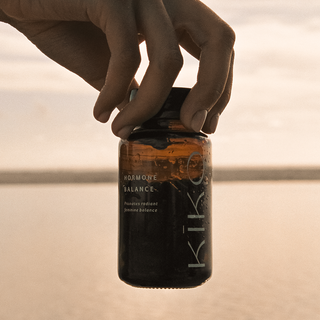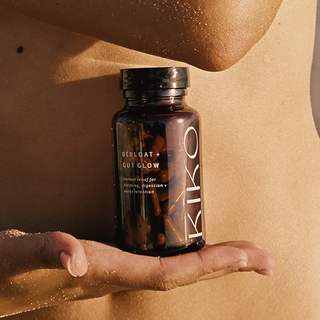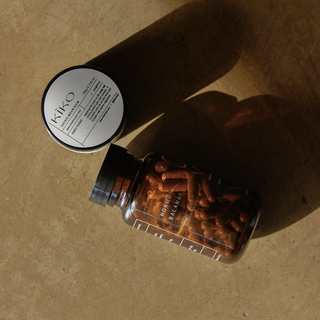
Endometriosis, often known as Endo, is a disorder that affects one out of every ten women in which endometrial cells develop outside the uterus and react to the menstrual cycle. Excess oestrogen causes the production of lesions/growths that may take up to ten years to detect, generally in a woman’s 30s. Endometriosis is a whole-body inflammatory condition that may cause pelvic discomfort, bowel and urinary issues, heavy menstrual flow, nausea or vomiting, pain during sex, bloating, exhaustion, anxiety, depression, irregular menstrual cycles, and infertility.

Symptoms often coincide with menstrual cycles. Endo may be managed and healed by balancing blood sugar, GI flora, and nutrient-dense diets, minimising stress, and avoiding pollutants. Endo is induced by oestrogen dominance, which may be caused by stress, elevated cortisol, increased body fat, and excessive alcohol. The Endo-Oestrogen Imbalance-Gut link demonstrates that gut bacteria may create and degrade oestrogen, potentially leading to oestrogen dominance. Endometrial lesions may also impair the gut’s capacity to move waste, resulting to SIBO and microbiota imbalance.
A basic gut health plan includes limiting exposure to inflammatory agents and toxins, balancing or re-establishing beneficial bacteria in the gut, and regulating stomach acid production. Inflammatory foods such as wheat, gluten, dairy, soy, maize, and refined sugar should be avoided. Unless absolutely required, limiting exposure to inflammatory chemicals such as alcohol, antibiotics, birth control pills, and synthetic medications is also vital. Consuming warm water with lemon, raw apple cider vinegar, digestive bitters, and vitamins will help to balance the healthy gut flora. An anti-inflammatory diet programme that uses exclusion diets to decrease inflammation is also useful.
Symptoms of Endometriosis
Endometriosis symptoms differ from woman to woman. Some Endo patients have tremendous discomfort, while others have no symptoms at all. The most common symptoms of Endometriosis include:
- Pelvic pain: This is the most prevalent Endo symptom. Endometriosis may cause discomfort during or after intercourse, during ovulation, or throughout the menstrual cycle. The pain might be intense or mild, and it could be located in the lower abdomen, lower back, or rectal region.
- Heavy or painful periods: Women with Endo may endure excessive bleeding or painful periods throughout their menstrual cycle. Pain in the lower abdomen, lower back, or rectal region is possible.
- Bowel and urinary disorders: Endometriosis may cause bowel or urinary problems, including constipation, diarrhoea, painful bowel motions, painful urination, and blood in the urine.
- Infertility: Endometriosis may cause infertility because the growths might restrict the fallopian tubes or harm the ovaries.
- Fatigue: Women with Endo may experience fatigue or a lack of energy due to the body’s constant inflammation.
- Bloating: Women with Endo may experience bloating or swelling in the abdomen or pelvis.
- Nausea or vomiting: Women with Endo may experience nausea or vomiting during their menstrual cycle.
- Anxiety and depression: Endo can also cause emotional symptoms such as anxiety, depression, or mood swings.
It’s important to realise that the intensity of Endometriosis symptoms does not always correspond to the severity of the condition. Women suffering from severe Endo may have moderate symptoms, while women suffering from mild Endo may experience severe symptoms. If you are suffering any of the aforementioned symptoms, it is critical that you consult with your doctor.
Endometriosis Statistics

If you are suffering from Endo, you are not alone, here are some statistics on Endometriosis:
- Endometriosis affects approximately 1 in 10 women of reproductive age.
- It is estimated that over 176 million women worldwide have Endometriosis.
- Endometriosis is one of the leading causes of infertility in women.
- On average, it takes around 7-10 years for a woman to receive a diagnosis of Endometriosis.
- Women with a family history of Endometriosis are more likely to develop the condition.
- Endometriosis can occur in women of any age, but it is most commonly diagnosed in women in their 30s and 40s.
- Women with Endometriosis are more likely to have other autoimmune disorders such as lupus, rheumatoid arthritis, or multiple sclerosis.
- Endometriosis can also affect men, although this is rare.
- In severe cases, Endometriosis can cause adhesions and scarring, leading to bowel or bladder obstruction.
- Endometriosis can cause significant physical, emotional, and financial burden on women and their families.
These statistics highlight the widespread impact of Endometriosis and the need for increased awareness, education, and research into the condition. This is where Kiko Vitals comes in, checkout our online shop for the range of our supplements that may be of help to you. It is essential to talk to a healthcare provider if you suspect you may have Endometriosis, as early diagnosis and treatment can help manage symptoms and improve quality of life.
Ways to manage and heal endo
Endometriosis is a chronic condition, and there is no cure for it. However, several ways can help manage and heal Endometriosis symptoms, such as:
- Balancing blood sugar: cut out refined sugar and processed foods, and combine balanced meals consisting of healthy fats, fibre and protein.
- Balancing GI flora: Endo can disrupt gut bacteria, leading to inflammation and hormonal imbalances. Consuming probiotic-rich foods or taking probiotic supplements can help rebalance gut bacteria and improve overall gut health.
- Decreasing inflammation: Inflammation is a significant contributor to Endo symptoms. Consuming anti-inflammatory foods like fruits, vegetables and other organic fresh whole foods and proteins can help reduce inflammation in the body.
- Mitigating stress: Stress can exacerbate Endo symptoms. Practising stress-reducing techniques like meditation, yoga, or deep breathing exercises can help reduce stress levels.
- Reducing exposure to toxins: Exposure to toxins can worsen Endo symptoms. Reducing exposure to toxins like pesticides, chemicals, and heavy metals can help improve overall health and reduce inflammation.
It is vital to remember that treating Endometriosis symptoms may need a diverse strategy. Partnering with a healthcare practitioner to create a specific treatment plan that may involve medication or lifestyle modifications may aid in the management of Endo symptoms and improve overall quality of life.
Hormones and Endo

Endometriosis development and progression are influenced by hormonal abnormalities, notably oestrogen dominance. Oestrogen dominance occurs when the body has too much oestrogen in comparison to progesterone. This hormonal imbalance may promote inflammation and help Endometriosis lesions develop and multiply. Here are some causes of oestrogen dominance:
- Stress/high cortisol: High levels of stress and cortisol in the body can lead to oestrogen dominance by increasing the production of oestrogen and decreasing the production of progesterone.
- Pregnenolone steal: Pregnenolone is a precursor hormone that the body uses to make both cortisol and progesterone. When cortisol levels are high due to stress, the body may “steal” pregnenolone to produce more cortisol, leading to a decrease in progesterone levels.
- Cortisol blocks progesterone receptors: Cortisol can block the receptors for progesterone, reducing the effectiveness of progesterone in the body.
- Xenoestrogens mimic oestrogen: Xenoestrogens are synthetic chemicals that can mimic the effects of oestrogen in the body, leading to hormonal imbalances.
- Excess body fat: Fat cells can produce oestrogen, so excess body fat can contribute to oestrogen dominance.
- Excessive alcohol: Alcohol can increase oestrogen levels in the body, leading to hormonal imbalances.
Endometriosis symptoms may be managed by addressing oestrogen dominance. To assist control oestrogen dominance, a healthcare professional may offer lifestyle adjustments such as weight reduction, reduced alcohol intake, reduced exposure to xenoestrogens, and stress management approaches.
Endo, Oestrogen Imbalance and Gut Health

The oestrogen estrobolome refers to the gut bacteria that are involved in the production and breakdown of oestrogen. These bacteria are critical in controlling the body’s hormonal balance. Imbalances in the oestrogen estrobolome may result in oestrogen dominance, which is a major cause of Endometriosis.
Oestrogen dominance can occur if:
- Bacteria reactivate inactive oestrogen: Some gut bacteria can reactivate inactive oestrogen, leading to an increase in oestrogen levels in the body.
- Stomach produces oestrogen-like molecules when BPA is consumed: Bisphenol A (BPA) is a synthetic chemical commonly found in plastics and food packaging. When ingested, BPA can mimic the effects of oestrogen in the body, leading to hormonal imbalances.
Endometrial lesions may impair the gut’s capacity to move waste, resulting in an increase in toxins and inflammation in the body. This may exacerbate Endometriosis symptoms by promoting small intestine bacterial overgrowth (SIBO) and microbiome abnormalities.
LPS (lipopolysaccharides) are bacterial toxins that might aggravate Endometriosis symptoms. LPS may enter the circulation via a leaky gut and cause an inflammatory reaction, resulting in Endometriosis discomfort and inflammation.
Endometriosis symptoms may be managed by regulating the oestrogen estrobolome and intestinal health. Consuming a balanced diet, minimising BPA exposure, limiting antibiotic usage, and fostering a healthy gut flora via the use of Kiko Prebiotic + Probiotic and Kiko Hormone Balance may help control hormonal imbalances and alleviate Endo symptoms. It is critical to collaborate with a healthcare physician to build a specific treatment strategy for Endometriosis symptoms.
Basic Gut Health Protocol & Nourishing for Endo

A healthy gut is essential in managing Endometriosis symptoms. Here is a basic gut health protocol that can help improve gut health and reduce Endo symptoms:
- Reduce exposure to inflammation-causing agents and toxins to improve leaky gut: Consuming foods that are high in toxins, like processed foods, and foods that cause inflammation, such as refined sugar, can contribute to gut inflammation and damage. Avoiding these foods and consuming a nutrient-dense diet rich in anti-inflammatory foods like fruits, vegetables, and organic sourced foods can help improve gut health.
- After improvements are seen, balance/re-establish beneficial bacteria in gut: Consuming probiotic-rich foods or taking probiotic supplements can help improve gut bacteria and promote a healthy gut microbiome.
- After Steps 1 and 2 are routine and familiar, improve stomach acid production (“light digestive fires”): Adequate stomach acid is crucial in breaking down food and absorbing nutrients. Consuming foods that promote stomach acid production, such as fermented foods like sauerkraut, can help improve digestion and nutrient absorption.Checkout Kiko Debloat + Gut Glow supplement, it is rich in digest enzymes and calming properties.
In addition to the basic gut health protocol, avoiding inflammatory foods may aid in the reduction of inflammation and the improvement of gut health. Wheat/gluten, dairy, soy, maize, and refined sugar are all common inflammatory foods. Limiting your exposure to inflammatory chemicals like alcohol, antibiotics, birth control pills, and synthetic medications, unless absolutely essential, may also assist improve your gut health.
An anti-inflammatory diet can help reduce inflammation in the body and manage Endometriosis symptoms. Here’s an example of an elimination diet protocol that can help identify trigger foods and reduce inflammation:
- Eliminate all potentially inflammatory foods for 21 days, conventional beef, corn, dairy, gluten, nightshades (tomatoes, peppers, eggplants, etc.), soy, and sugar.
- After 21 days, slowly add one food group back at a time, and monitor symptoms for a few days. If symptoms reoccur, it may indicate that the added food is an inflammatory trigger.
- If a food group is found to be an inflammatory trigger, eliminate it from the diet for a period or consume it in moderation.
- Focus on consuming whole foods, including fruits, vegetables, lean protein, healthy fats, and complex carbohydrates.
- Avoid processed foods, fried foods, and foods with added sugars or artificial ingredients.
In addition to the elimination diet protocol, to nourish the body for endo, focus on adopting a nutrient-rich, anti-inflammatory diet that supports overall health and reduces endometriosis symptoms. Emphasise whole foods, including a variety of fruits and vegetables, lean proteins, and healthy fats. Incorporate omega-3 fatty acids from sources such as fatty fish. Limit processed foods, refined sugars, and trans fats, as they can exacerbate symptoms. Additionally, it is crucial to stay well-hydrated and consider supplementing with essential vitamins and minerals like magnesium, vitamin D, and calcium under the guidance of a healthcare professional. By nourishing the body with these wholesome ingredients, individuals with endometriosis can better manage their symptoms and promote overall well-being.
Conclusion
Endometriosis is a common condition affecting 1 in 10 women, but it is often misdiagnosed or undiagnosed for years. Endometriosis isn’t just painful periods; it’s a whole-body inflammatory condition that can lead to severe pain, inflammation, and other signs of distress in affected areas. However, with proper management, it is possible to improve Endometriosis symptoms and reduce inflammation in the body.
Managing Endometriosis involves balancing hormones, improving gut health, reducing inflammation, and avoiding trigger foods and substances. Incorporating lifestyle changes such as a balanced diet, stress management, and reducing exposure to toxins can help regulate hormonal imbalances and reduce inflammation.
Remember, you don’t have to suffer in silence. It’s crucial to discuss any signs or symptoms of Endometriosis with a trusted healthcare professional and seek support from loved ones. Also check Kiko Vitals’ range of all natural organic supplements. With awareness and proper management, women with Endometriosis can improve their quality of life and reduce the impact of this condition on their daily lives.



